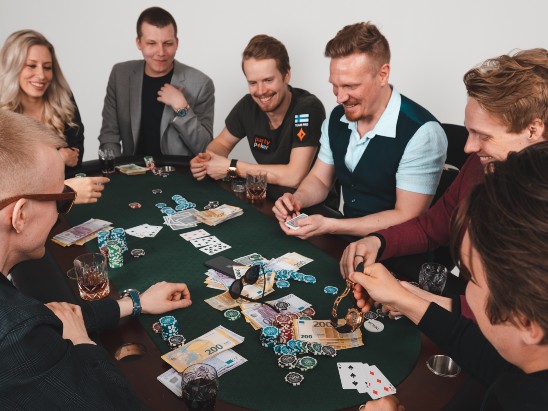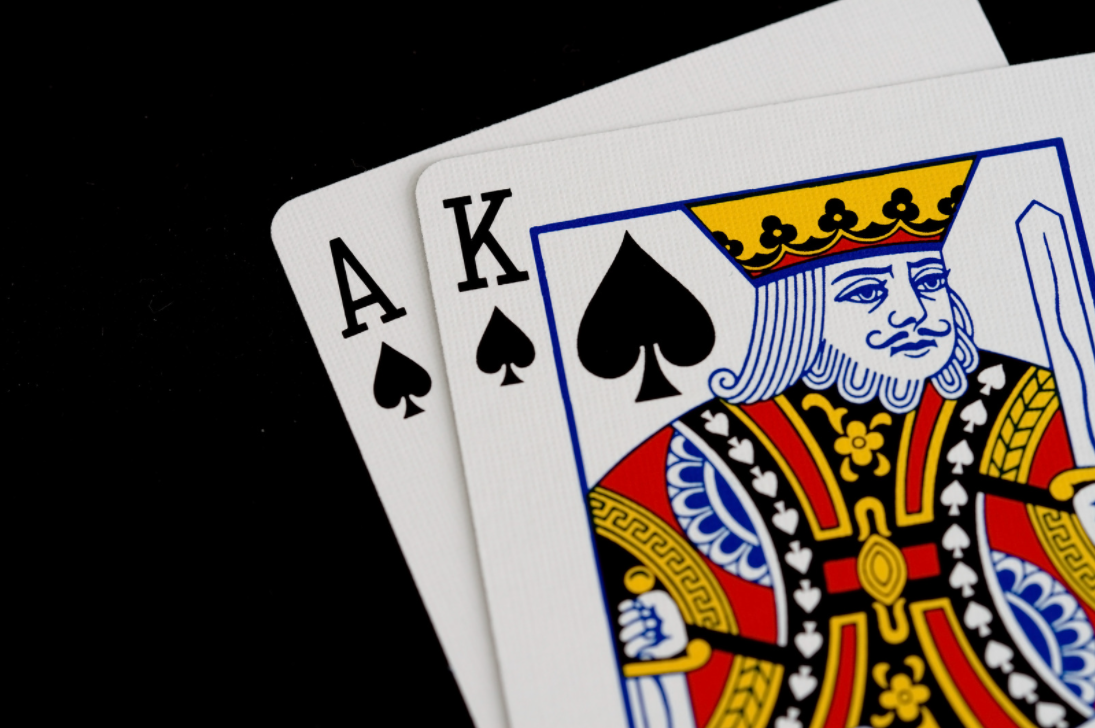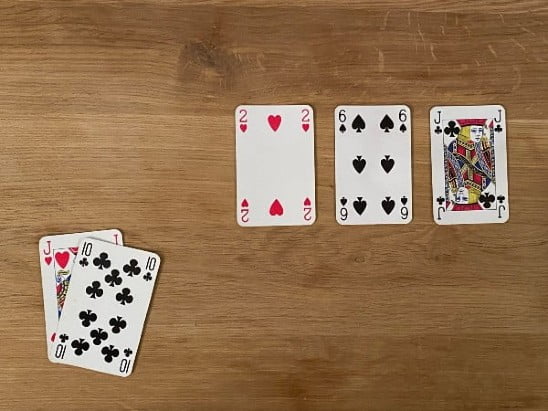In this in-depth article you can find a brief history of the poker boom and how it developed, and learn some basic concepts to help you become a winning player.
As a highly competitive game, poker became a very popular and cool thing to do after 2003 when Chris Moneymaker revolutionized poker by winning the World Series of Poker main event after qualifying through an online satellite for just 86 dollars. He took down the $2.5 million trophy after beating Sam Farha in the heads-up with a full house holding 5♦4♠ against Farha’s J♥10♦ with the board running J♠ 5♠ 4♣ 8♦ 5♥. A legend in tournament poker was born!

Moneymaker was playing his first live tournament ever and still won the first prize. Some might ask how was this possible? It all comes down to poker being a game that combines both skill and luck. Short-term, luck is king – long-term, skilled players are going to win. Nevertheless, an accountant from Tennessee named Moneymaker winning the WSOP in 2003 was definitely the single most important moment for what would become a poker boom in the next few years.
Something magical happened after his massive win: Suddenly everybody with internet access saw the headlines and thought to themselves ‘if he can do it, why not me?’. And there you have it: Hundreds of thousands of people clicking the red ‘Create Account’ button on PokerStars and starting to play poker online, having hardly any previous experience of poker. PokerStars would later become the market leader in online poker, and also hire Moneymaker as their Team PokerStars Pro member.
In no time the image of a professional poker player quickly changed from an old rounder in cowboy hat playing in a room full of smoke to that of a nerd sitting comfortably at home with dual monitor setup playing 20 tables at once. Making a living from home by clicking buttons online was now the hottest career option for many people for several years, until it all changed in one day the history knows as the Black Friday of poker. On April 15 in 2011, PokerStars and Full Tilt Poker were shut down in the United States by the Justice Department due to violation of Unlawful Internet Gambling Enforcement Act of 2006. Since that day the popularity of poker declined for some time, seeing some marks of revival especially in the live poker scene during 2017 and online poker gaining popularity in Asia as well. The next poker boom might be just behind the corner!
If you want to win in the game of poker and also enjoy playing, it’s better to prepare well and study the game. Even if you’re familiar with other card games, we advise you to study poker a bit before playing since getting good at poker is no simple task. To help you do well in the long-term, we have structured the Ultimate Poker from Beginner to Pro for you – let’s get right down to it!
What is so difficult about learning to play poker?
So how does one learn poker when every card dealt to you is random? As human beings, we generally learn how things operate by trial and error. We take some type of action and then watch what happens – it’s this loop that sometimes leads you completely wrong in poker, as brilliant plays don’t always pay off! You can learn the rules of poker in a few minutes, but mastering the game might take tens of thousands of repetitions and several years. Those that don’t work hard on their game will most likely be out of it in no time.
How does a Texas Holdem poker game work?
Let’s take a look on how Texas Holdem, pretty much the most popular poker game on earth, is played so that we have the basics nailed down before discussing some actual strategy.
Start of the hand
Each player at table is dealt two cards face down. These are called your hole cards. A round of betting occurs starting from the player sitting next on the left to the Big Blind, and this position is usually known as Under the Gun. The first round of betting is called preflop, and every player has the option to call, raise, or fold on their turn. Which option to take depends a lot on the blind structure, how many players are left to act after your turn and obviously the starting hands dealt to you. If you’re not sure what kind of starting hands you should be looking to play, just take a quick look at our guide to Poker Hand Rankings.
Betting is the key to poker in a sense: In every hand there will be one or more betting rounds during which players seated at the table can bet on their hands. You’ve probably heard that it’s important to minimize losses and maximize winnings in investing – the same principle holds true in poker. You have to protect your stack when the odds are not on your side, and get the money in when you have the best of it.

Once the preflop betting round is finished, the hand proceeds to the flop. The flop means that three community cards are dealt face up on the table:
K♥ 3♣ 7♥
On the flop all players gain a lot of new information regarding how likely they are going to win the hand: With pocket pairs you see if you have flopped a set, with big pairs you see whether are any overcards on the board compared to you pair, with all types of hands you see whether you’ve flopped a made hand, some kind of a draw or completely whiffed etc. Once the flop is dealt, a new betting round occurs starting from the player sitting left next to the Button. On later streets only one community card per betting round is revealed, which is why the structure of the flop will impact quite a bit on how the hand will play out.
On the turn a fourth community card is dealt face up, and a third betting round occurs with the same principles as on the flop:
K♥ 3♣ 7♥ 8♣
On the river, the last community card is dealt and a final round of betting occurs. You can now see the final five-card poker hand that can be formed using both your hole cards and community cards:
K♥ 3♣ 7♥ 8♣ 2♦
Let’s say you’re holding K♦K♣ and board reads our K♥ 3♣ 7♥ 8♣ 2♦ – in this case you’re holding the best possible hand that can be formed with the community cards, which is often called the nuts. If the board had run out A♦ 4♦ 4♣ 7♣ 7♥, your hand would be two pair, Kings and Sevens. Any opponent with an Ace, Four, or Seven would beat your hand here. It could also happen that the best hand can be made from the community cards alone: While you are holding the same Pocket Kings and the board running out 4♣ 5♦ 6♥ 7♦ 8♥, your best hand would be an 8-high straight. But, any player holding a Nine or Ten Nine would have you beat, and at best you would split the pot against any hand at the Showdown.
The Showdown occurs if the river betting round is finished with two or more players still holding their cards. In this case, the last aggressor who made a bet or a raise, needs to turn over their cards first, after which the other players still in the hand do the same. The player with the best hand wins the pot.
If at any point of the hand some player has made a bet or a raise that everyone has folded to, the hand ends automatically with no further community cards being revealed & no more betting rounds taking place. In an aggressive game, the majority of hands will end this way, and by now you’re probably thinking to yourself: Can I win in Texas Holdem just be being aggressive? Yes you can! They don’t call it the Cadillac of poker for no reason – the reason this game is so fascinating is that you don’t necessarily need the best hand to win, but simply putting people to the test for their entire stack can do the trick.
Let’s go through a checklist that will help you to follow the game while playing:
Table positions
Besides being aware of the blinds in each hand and your own position relative to them, it’s equally important to be aware of players sitting on both left and right to you – ideally, you want to have position (i.e. sitting on the left of somebody) on those players who make the most mistakes, like playing too many hands preflop, playing passively, not folding enough on the river and other things that you notice and can take advantage of.
Preflop action and stack sizes
To evaluate how you should play your own hand preflop, follow closely how the action unfolds. Does a tight player with a small stack make a large raise from early position? Throw your marginal hands away. Does a loose player with large stack make small raise and you have position on him? Try to isolate him by calling or reraising with any playable hands. Are there two extremely tight players in the blinds and you’re on the Button? Steal as much as you can get away with!
Flop structure and betting action
How likely it is that players in the hand have connected with the flop? With a dry flop like Q♥ 7♦ 2♣ there are only a few combinations of strong made hands like QQ-AA, Queen with a high kicker, and set of Sevens or Deuces and perhaps some two pair combinations. There are no draws at all except for the backdoor draws. If you have a made hand like Queen Jack on this kind of dry flop, you’re either way ahead or way behind, so you don’t have to worry too much about opponents outdrawing you.
What about a flop of J♠ T♠ 9♣ then? That’s called a wet flop, and boy there are all kinds of draws out there! Plenty of made hands are possible on this flop: Straights, Sets, Two Pairs, Pairs with a Gutshot are all possible, and strong combo draws like Flush Draw + Open-ended Straight Draw can be even be slight favourites against weaker made hands.
Turn action
Once you get to the turn, there is only more possible community card left to see. Any draws completed on the turn like Flush Draws and Straight Draws, can drastically change the relative strength of made hands. Big bets made on the turn can force people to fold their weak made hands or draws, since they don’t get proper odds to call and see the river.
River action
River is the street that can really separate men from boys. You either have the best hand or you don’t, and if you missed your draw no more help is coming your way. Now it’s time to decide whether your hand is good enough to bet or raise for value, check down or check and call a reasonable bet. Alternatively, if you have low enough chances to win at showdown, you should evaluate whether it’s profitable to bluff with your hand – or turn it into a bluff in case you think your opponent has a stronger made hand but might let that go against a raise or a reraise.
Hands at the Showdown
Whether you’re involved in the current hand or not, you should always watch closely to what hands are being showed down if two or more players remain after the final betting round has finished. This is free information that can reveal a lot about other players, and how you should play against them in the future hands to come.
You have now taken the first step to becoming a Beast in No-limit Texas Holdem!
Recap of how Texas Holdem works
Can you follow a game of Texas Holdem described with poker slang? Let’s find out!
- The game starts: You’re dealt hole cards
- A round of betting also known as preflop
- Players who remain in the hand, see a flop – we move into postflop play
- The flop betting round occurs
- The remaining players see a turn, the 4th community card
- Time for the turn betting round
- You see the river, it’s time to separate men from boys!
- Round of betting which is the last one
- The best five card hand wins, or the last player to remain after the betting round wins
All crystal clear? Perfect, you can move on to the next section!
What are the blinds?
Blinds are the reason the poker games runs: If there are no blinds, there is nothing in the pot to play for, and players would be better of playing just AA and try to get someone to call them. Blind structure is an important part of No-Limit Holdem, and the most common structure is two blinds, Small Blind and Big Blind. Two players directly left to the dealer button are forced to put these in the pot before a new hand starts. The term Blind comes from the fact that you don’t see your cards but are still putting your Blind money in the pot.
Many casinos offer No-Limit Holdem with blinds 1/2 USD/EUR or equivalent as their most popular low-stakes game, meaning that the Small Blind is 1 USD and the Big Blind is 2 USD. The minimum buy-in for this type of game can be between 40-200 USD depending on the casino rules.

How do I know if someone is bluffing?
There are multiple factors that go into considering whether someone is bluffing, and it’s impossible to give you an exact answer for this question. If someone is playing poker well, they should balance their strong hands with some types of bluffs or semi-bluffs. On the other hand, reckless players who are betting every time it’s their turn, are more likely to have a bluff than a big hand in Full-Ring Texas Holdem, since it’s quite hard to actually make a strong hand in this game. It all comes down to tendencies of players: Loose-aggressive players bluff a lot, tight-aggressive players bluff sometimes, loose-passive players don’t bluff a lot and tight-passive players bluff rarely if at all.
Generally speaking, bluffing is one of the most misunderstood areas of poker. Sure, it does play an essential part of proper Texas Holdem strategy, but first you should learn other fundamental concepts such as relative hand strength and value betting before implementing semi-bluffs and bluffs into your game. But, if you want to try it out no matter what, you can start by semi-bluffing through firing a bet on the flop and/or the turn with your strong draws like Open-Ended Straight Draws and Flush Draws.
Beginner Tips on how to play poker
Here’s a list of beginner tips should follow when playing poker:
Don’t play too many hands!
Stick to the best starting hands, so that you generally play at maximum a fifth of all the hands that are dealt to you. To see what some good hands you should play are, check the ‘Evaluating the Strength of Starting Hands’ and ‘Top 10 Starting hands for No-Limit Texas Holdem’ sections in our Poker Hand Rankings.
When you get a big hand, bet and raise aggressively
With big hands you want to build big pots to win the maximum from your opponents. The best way to win their stacks is to build big pots with big hands.
Try to avoid calling a lot
By calling you can only win by one way, which is having the best hand. By betting and raising, you can win the pot also without showing your cards. Being aggressive in poker is far superior to being passive!
Intermediate Tips on how to play poker, and start to win
Here’s a list of intermediate tips you should follow to start winning in poker:
Play in position
When you’re last to act, you have more information than your opponents and are able to better control the final pot size. Playing in position allows you to make better value bets and bluffs as you get to see how your opponents react to different flops, turns and rivers.
Don’t get attached to monster preflop hands after the flop
An Ace on the flop, a four-card straight or a flush on the board are examples of situations where you should proceed cautiously even with monster preflop hands, such as Pocket Kings and Pocket Queens.
Advanced Tips on how to play poker, and start to win more
Learn the basic odds in poker
What are the most important odds in poker you should learn? There are countless odds in Texas Holdem regarding different situations, but you should memorize the ones that occur most frequently. Some of them include the following:
Being dealt AA: 0.5%
Being dealt AA or KK: 0.9%
Being dealt any pocket pair: 5.9%
Hitting a pair or better by the river: 50%
Hitting an OESD from flop to river: 31.5%
Hitting a Flush Draw from flop to river: 35%
Hitting a Gutshot on from flop to river: 17%
Hitting a Full House or better with Three of a kind from flop to river: 33.4%
Flopping an OESD with connectors from 54 to JT: 9.6%
Flopping a Set with pocket pairs: 11.8%
Flopping at least a pair with two unpaired hole cards: 32.4%
All-in preflop, Overpair vs a Pair: 80% – 20%
All-in preflop, Underpair vs Overcards: 57% – 43%
Extra: Flopping a straight flush with a medium suited connector: 0.02%
Play the player
All strong poker players can play a balanced strategy with correct starting hands and close to optimal frequencies for each action of folding, betting, raising and calling. The players who make the most money in poker are those who exploit their opponents well, which means they understand how to punish their opponents for their mistakes made over and over at the tables.
How to play online poker for real money?
Now that you have the basics of how to play poker nailed down, what would be the logical next step? Playing some actual hands of poker of course! The fastest way you can get some experience on your belt is starting to play online. Playing online allows you to play without any social pressure that might occur when playing live poker in a casino for the first time – you can just relax, open up a poker client and fire up a table or two and play at your own pace (wearing just pyjamas if that’s comfortable!).
The other obvious option would be to organize a home game with your friends, but the downside of that is it takes some time to invite everybody and agree on the schedule and stakes, not to mention that the actual gameplay is probably very slow. Therefore starting out by experimenting with online poker is a superior choice, as you can learn faster and get more repetitions in the same timeframe. Hundreds of thousands of players log in to their online poker account each day to play, meaning you will have no problem in finding somebody to play with!
The goal when you first start out with online poker is simple: To play a batch of hands and get comfortable with the gameflow in online poker. You can actually start out with some play money poker apps, until you feel you’re ready to play with in real money games. The reason it’s not good to stay too long in play money games: People play way different when the actual chips in front of them are of real money value.
To make the best-informed decision regarding where to play, you should get familiar with the pros and cons of different online poker rooms. Beasts Of Poker offers you some of the best sign-up bonuses and rakeback deals so make sure to take advantage of them!
If you’re just starting out with online poker, our top recommendation at the moment is playing at GGPoker. GGPoker has great amount of games going at any time and soft low-stakes games available in both Texas Holdem and Omaha.

How to play live poker at your local casino?
Planning to make your first trip to the local casino and play some cards? To avoid being totally overwhelmed, let’s go through a checklist that will help your trip go as smooth as possible with a good playing experience:
Check in & put your name on the waiting list
You might have to register at the casino to be allowed to play, and in most cases it’s worth registering anyway to receive some comps from the casino later when you have spent some hours at the tables. Once you have registered and checked in, just ask where the poker room is, walk there and put your name on the waiting list!
Avoid playing casino pit games & slots!
Our advice is to stay away from all the table games and slots while waiting for a seat, as playing those games with negative expectation might soon become a habit that is hard to get rid of. If you have friends who play at the same local casino, you can ask if they’re willing to be your accountability buddies on this one. Playing negative EV games is a costly leak for many cash game players, and you don’t want to end up joining them!
Get familiar with the house rules
Every poker room should have their rules posted somewhere so make sure you get a glance at those before you sit down to play. This way you can avoid some nasty surprises that wouldn’t occur when playing online or in a home game with friends.
Buy some chips while waiting for a seat
You can also buy some poker chips at the table if you wish, but if you’re on the waiting list you can do this while waiting to get a seat at a poker table.
Listen for your name to be called out
Most likely your name will called out over a PA system. If you miss your name getting called and don’t arrive to the table in a few minutes, they will take you off the waiting list – make sure to listen so you don’t lose the chance to sit down at the table!
Learn some 'Poker lingo' to better understand what other players are talking about
You’re likely to hear all kinds of strange terms and abbreviations at the poker table, and knowing how to speak poker can come in handy while playing in a live game. To get familiar with the most common terms used in poker, you can check out our All-inclusive Glossary of Poker Terms here.
Keep calm & start playing some poker
Enter the game once the Big Blind arrives to you. Before that happens, you can follow the game and see how the other players play. In the beginning it’s best to always call out our action when the action is on you, by saying ‘raise’, ‘call’ or ‘fold’. Protect your cards by placing a chip on top of them, and always pay attention to the action so you always know whose turn it is. Don’t be afraid to ask the dealer questions if something is unclear to you.
Which poker game should I choose?
Texas Holdem is regarded as the ultimate poker game, as it currently outranks other game formats in popularity by a wide margin. It’s quite easy to learn once you have played it a few times, but it takes a lot of effort and play to mastering it. Texas Holdem is the format that World Series of Poker $10000 Main Event is played with. However, there are other poker variations though that you could also consider trying out:
Omaha Hi (Pot-Limit Omaha)
Once you’ve learned the basics of Texas Holdem, Omaha Hi is quite easy to get a grasp of as the game is played in a somewhat similar manner. Instead of playing with two pocket cards, in Omaha you play with 4 pocket cards of which you must use exactly 2 to make the best hand with 3 cards from the community cards. Unlike in Holdem, you can’t play the board as you must use two cards from your starting hand in Omaha. The betting rounds are the same as in Holdem, with one betting round occurring preflop and three betting rounds occurring post-flop (on the flop, on the turn and on the river). Omaha can be quite an action-packed game especially if players are sitting deep-stacked, which is why some players prefer Omaha over Holdem.
Stud Poker (7 Card Stud)
7 Card Stud is one of the classic poker games that is still played at some casinos. Every player gets 7 cards with no community cards in play, and there are a total of 5 streets to bet on. Since the game differs quite a lot from Holdem, it’s important to understand the rules of 7 Card Stud before jumping into playing it – you can read the rules of 7 Card Stud.
Omaha Hi Lo
Omaha Hi Lo differs from normal Pot-Limit Omaha in one key area: Instead of players competing for the Hi Hand, there is now also the Lo Hand in play. The pot at the end of the hand, in case it goes to the showdown, will be split between the Hi Hand winner and the Lo Hand winner. To win the Lo Hand part of the part, you must form the 5-card hand with no cards higher than 8 and your Lo Hand must have lower cards than the next best Lo Hand. Same as in Pot-Limit Omaha, this game is usually played with the pot-limit betting structure. You must also use exactly 2 cards from your hands to form both the Hi and Lo Hand. In case you manage to have the best Hi and Lo Hand in showdown, you will scoop 100% of the pot in this game.
Draw poker
Draw poker is basically any poker variant in which each player gets dealt a complete hand before the first betting round occurs, and after the first betting round the player can try to develop their hand for later rounds by replacing any number of cards from his hand, which is called drawing cards. The most common variant is Five-card draw, which is one of the simplest forms of poker and is also the basis for video poker slots that you can play at betting shops or casinos. In California, Fiver-card draw is sometimes played with Jokers, also known as wild cards. Many draw poker variants are played with antes instead of blinds.
Mixed Games
There are many mixed game formats in poker, with two of the most common games being H.O.R.S.E consisting of Texas hold ’em, Omaha high-low, Razz, Seven-card stud and Seven-card stud Eight-or-better, and 8-Game which has these 8 variants of poker: Deuce to Seven Triple Draw, Razz, Pot-Limit Omaha, Stud High-Low, Limit Omaha High-Low, No-Limit Texas Hold’em, Seven Card Stud and Limit Texas Hold’em. Each game variant will be played for either a fixed number of hands or a set time, after which the players move to the next variant. The different nuances of mixed game variants take quite some time to learn, so we would recommend trying out mixed games only after you’re an experienced player in other poker formats.
Final words
Learning to play poker can be quite a lot of fun, as you can play either with your friends at home or at a casino, or against people from all corners of the globe online. Poker is a game of both skill and luck, but learning the fundamentals of poker strategy will give you a long-term edge over your opponents. Challenging yourself to improve in poker is something many players enjoy, and we recommend studying & reading about poker regularly once you pick up poker as a hobby. This way you’ll enjoy it more, and it can even become a profitable source if income for you.
Remember to take your time to make the best decisions at the table, and enjoy the game. Good luck at the tables!♦♥
Become the player you were born to be and start dominating the games – Continue reading more tips & articles in Poker Articles!
Author

Johannes Turunen
Johannes is the Editor in Chief at Beasts Of Poker and is an expert in both live & online poker. Johannes played online poker semi-professionally for 5 years while completing his Master’s Degree in Technology.









